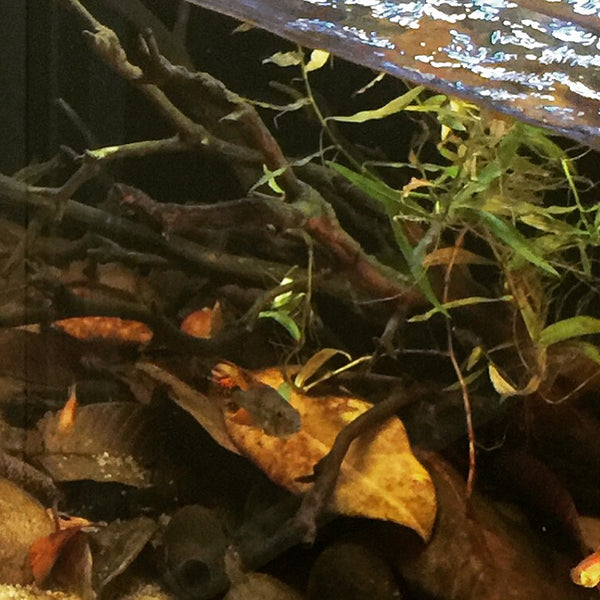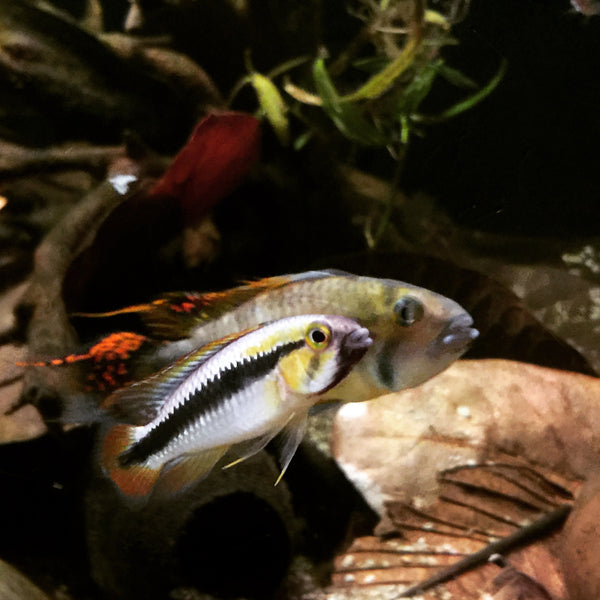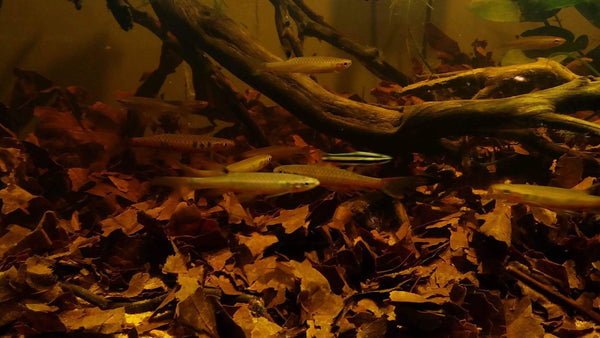- Continue Shopping
- Your Cart is Empty
Another mental shift...Searching for a bit more clarity on...clarity?
I'm not a scientist. I don't "play one on TV"- yet I have a curiosity about some obscure stuff that makes me wish that I majored in chemistry instead of marketing sometimes!
A friend, Vince Dollar, passed along an interesting tidbit of knowledge a while back...one of those things worth considering. He noted that a study on dissolved organics in bodies of water worldwide indicated that even seemingly crystal clear waters of Florida, Central America, and even ice-covered lakes in Antartica that have not been exposed to the atmosphere in millions of years, are laden with dissolved organics, with 40% to 80% of those organics being humic substances.

As a refresher, the International Humic Substances Society (I'm not kidding, this organization exists...Crazy-ass partiers, I'll bet!) in part, defines them as follows:
"Humic substances (HS) are major components of the natural organic matter (NOM) in soil and water as well as in geological organic deposits such as lake sediments, peats, brown coals and shales. They make up much of the characteristic brown color of decaying plant debris and contribute to the brown or black color in surface soils. They are major components of NOM in surface waters and at higher concentrations can impart a dark color, especially in brown fresh water ponds, lakes, and streams. In leaf litter or composts, the color may be yellowish-brown to black, depending on the degree of decay and concentration."
These substances, which have been proven by science to be so important to the overall health and well-being of fishes worldwide, are, in the words of our friend Vince, who has studied them extensively, "A foundational necessity. In some environments, such as Blackwater environments, they make life possible. Fish could not exist in these conditions without them. In other environments, such as Central American aquifer -fed streams and lakes, they make life better."

He further suggests that in our quest to make aquarium water look like our drinking water, we purposely remove these valuable compounds. It's interesting, isn't it? I mean, you wouldn't want to drink a cup of blackwater from the Rio Negro, so the assumption that fish would want to live in ultra-pure drinking water simply overlooks their physiological needs. They've evolved to inhabit a dramatically different environment than we typically provide in our aquariums- for better or for worse.
Interesting...
I'm not suggesting that providing pure, visually clear water is detrimental to fish health, but after studying so much on this topic lately, and observing the vibrant health of many of our fishes in "blackwater" aquarium environments that preserve the humic substances, it certainly makes me question the high regard we've ascribed to this standard; this decades-old practice. And visual "tint" is by no means a reliable, scientific measure of the presence of these substances, but it's a tip-off. Of course, blackwater, provided by the tannins and humic substances imparted by leaves, wood, and other botanicals, is arguably the most convenient, simple to deploy, and most natural "delivery mechanism for these substances that we have at our disposal as hobbyists.

Yet, the benefits of providing these substances for our fishes are, to borrow a phrase, "obscured" by our popular hobby perception that tinted water is somehow "dirty" and unacceptable to fishes and plants in aquariums. We've developed a sort of prejudice against water that is not pure, blue-white in appearance, sort of unfairly labeling anything which deviates from that "standard" as being "impure." Although, as mentioned above, humic substances (not necessarily the tannins that provide the visual "tint") are present in clear waters in the wild. Are there filtration media which selectively remove the undesirable organics (like nitrates, phosphates, etc.) and preserve some of the beneficial humic substances? Could we be "overdoing" it with carbon and such?
It's almost like our idealized aesthetic perceptions of what we feel water should look like in an aquarium have conditioned us as a hobby to sort of gently disregard what it truly looks like in the habitats from which our fishes evolved. Now, I'm certainly not asserting that keeping fishes in a crystal-clear aquarium is somehow going to ruin their vitality or render them susceptible to many illnesses, or that providing "blackwater" conditions is some sort of miracle concept that will lead to unimagined success. However, I'm at least curious about how much better our animals might do long-term (I'm talking decades in captivity of being bred, etc.) if maintained in conditions that more-or-less replicate the waters from which they evolved. We've seen a lot of Betta and Apistogramma breeders utilize these types of conditions in their aquariums for many years, and their successes have been obvious.
And sure, there are lots of examples of Discus, Tetras, etc. that have, over the years, been acclimated to and bred in municipal "tap water" conditions, often "harder" and more alkaline than their natural habitats. They look great and appear to be healthy. I just wonder, however- could they be that much more healthy if maintained under the conditions under which they evolved for millions of years? Have we really "bred out" their genetically-programmed environmental "requirements" in a few decades and dozens of generations- or could it be that, in our quest to make tropical fishes more "available", we've sort of created a kind of "forced fit" and used other means (high water quality, excellent food, selective breeding, etc. to "compensate" for the fact that they are being bred and reared in an environment decidedly different than the one in which they evolved?

And another, more random thought, which I simply don't know the answer to: To any great extent are any humic substances found in seawater- a medium capable of dissolving, at higher or lower concentrations, a very large number of organic compounds, thus making them directly available to its inhabitants? Are they something that might be present, yet "fly under the radar" because we don't test for them? Could the lack of these substances in marine tanks, which are often obsessively chemically filtered with carbon, zeolites, and the like be a contributing factor to the dreaded "HLLE" condition of marine fishes? I don't know, but it would be fascinating if this were the case...I'm checking with my marine chemistry nerd friends on this one!)
Interesting stuff to consider.

Yet again, this concept relates to that "mental shift" that we as hobbyists must make as we explore the possibilities with blackwater aquariums. Perhaps it's because I'm more attuned to it than ever before, but I see "tinted" tanks all over the place now. And they're usually from hobbyists that have chosen to specialize in certain fishes, like many South American cichlids, Killies, Tetras, etc. And I couldn't help but wonder if at least part of the reason why we don't see some of these fishes bred more commonly on a "hatchery" or "fish factory" level, if you will, is because they simply don't do as well under "tap water" conditions as other fishes. I wonder if these types of conditions are making them far less robust and spawns less frequent, smaller, and the resulting fry less vigorous than their progeny bred in more natural conditions. Conditions that smaller, more specialized breeders are more apt to provide.
Obviously, there are thousands of examples of successful spawns of soft, acidic, blackwater-loving fishes in hard, alkaline tap water. However, you just have to wonder what really makes the most sense in captivity over the long haul for fishes from these habitats. Of course, not being a geneticist or biochemist, I'm doing a healthy amount of speculating and postulating here, but when you evaluate the available information, in terms of where these fishes originate, and by what means they're most successfully being maintained and spawned over the long run in captivity, you can't help but think about it.

The discussion about what really are "proper" water conditions for our fishes may truly be "obscured" by the perceptions, attitudes, and aesthetic biases we harbor towards "pure" water. It's a world filled with speculation, anecdotal information, and a lot of scholarly, indecipherable-to-the-layperson information that may hold the answers. At least on a hobby level, we can do a certain amount of "research" as the concept of blackwater, botanical-influenced aquaria, with their capacity for production and/or preservation of humic substances grows.
YOU- the "tint community"- every one of you- are on the cutting edge, helping contribute to an exciting, hardly new, but previously long-neglected area of hobby experimentation.
I think it's all sort of neat. Even if the answers aren't "crystal clear"- just yet, anyways.
Stay curious. Stay observant. Stay creative.
And Stay Wet.
Scott Fellman
Tannin Aquatics











Scott Fellman
Author